"We are neither gods nor heroes, this is simply our job". Interview with 22-year-old search and rescuer Yurii Lozynskyi
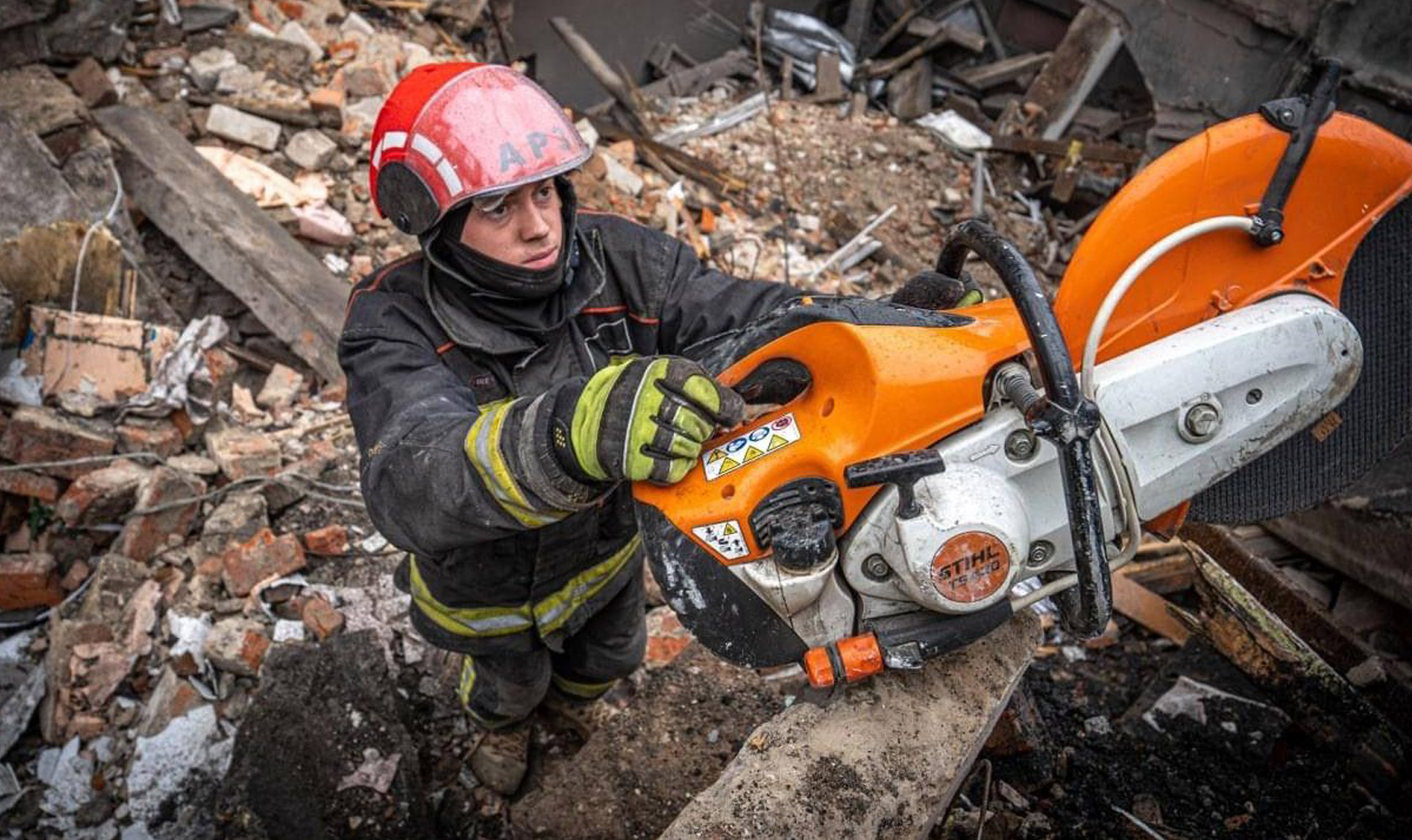
YEVHEN RUDENKO — SUNDAY, 6 NOVEMBER 2022, 05:30
Once upon a time, at the outskirts of Verkhnii Maidan village, a helicopter landed and after some time took off again, not far from a pasture and the house of the Lozynskyi family. Who that was and the purpose of this visit, is still unknown. But on the next day, people asked the Lozynskyi couple on the bus, bus in all seriousness: "Was that your Yura coming home to visit?"
Yurii Lozynskyi is a 22-year-old warrant officer with the State Emergency Service of Ukraine (SES). He has become a search and rescue specialist, and a part of a mine rescue unit that arrives to save lives after Russian rocket strikes. He saved Kyivans during the first strikes in February and the last massive terrorist attacks this autumn.
"To be honest, when I was still living in the village, I was an unobtrusive guy,"- he said. "I didn’t see my future there, and I wanted to become a soldier, but instead joined the SES.
People started talking about me in the village after the first photos of me together with a dog I saved appeared online. Someone saw it on Tiktok, someone - on Gordon’s Instagram feed [Dmytro Gordon is a Ukrainian journalist and interviewer - ed.]. Later, after the attacks on 10 October], the President thanked me along with a few others in a public address. After that, things started happening! Our priest talked about me at the church. I was told that people rewatched Zelenskyy’s address several times and cried.
Girls started texting me and liking my [posts]. I told them once: "You are going to hear about me and regret not waiting for me"."
In an interview with Ukrainska Pravda, Yurii Lozynskyi has shared how rescuers work in wartime, what happens when rockets strike residential buildings, and what motivates SES employees the most.
The following text is a direct speech.
Blood. Ukraine’s anthem. 6A Lobanovskyi Avenue
There is frequently blood on my work clothes, from someone else.
I need to wash it off my protective suit. Sometimes, hardly noticeable stains remain, but what can I do?
It is not a very pleasant feeling when you see somebody else’s blood stains under your feet, or when you walk up the stairs stepping over shattered glass in an empty house, seeing red drops everywhere on the floor.
You know that a person was injured there not long before. You wonder how he or she was escaping out of there to the street. Were they alone or did anyone help?
Window glass, shattering from a blast wave during a strike, is very dangerous. This is how people get injured most of the time.
Does scotch tape help? Yes. But only if you place it over a window very tightly.
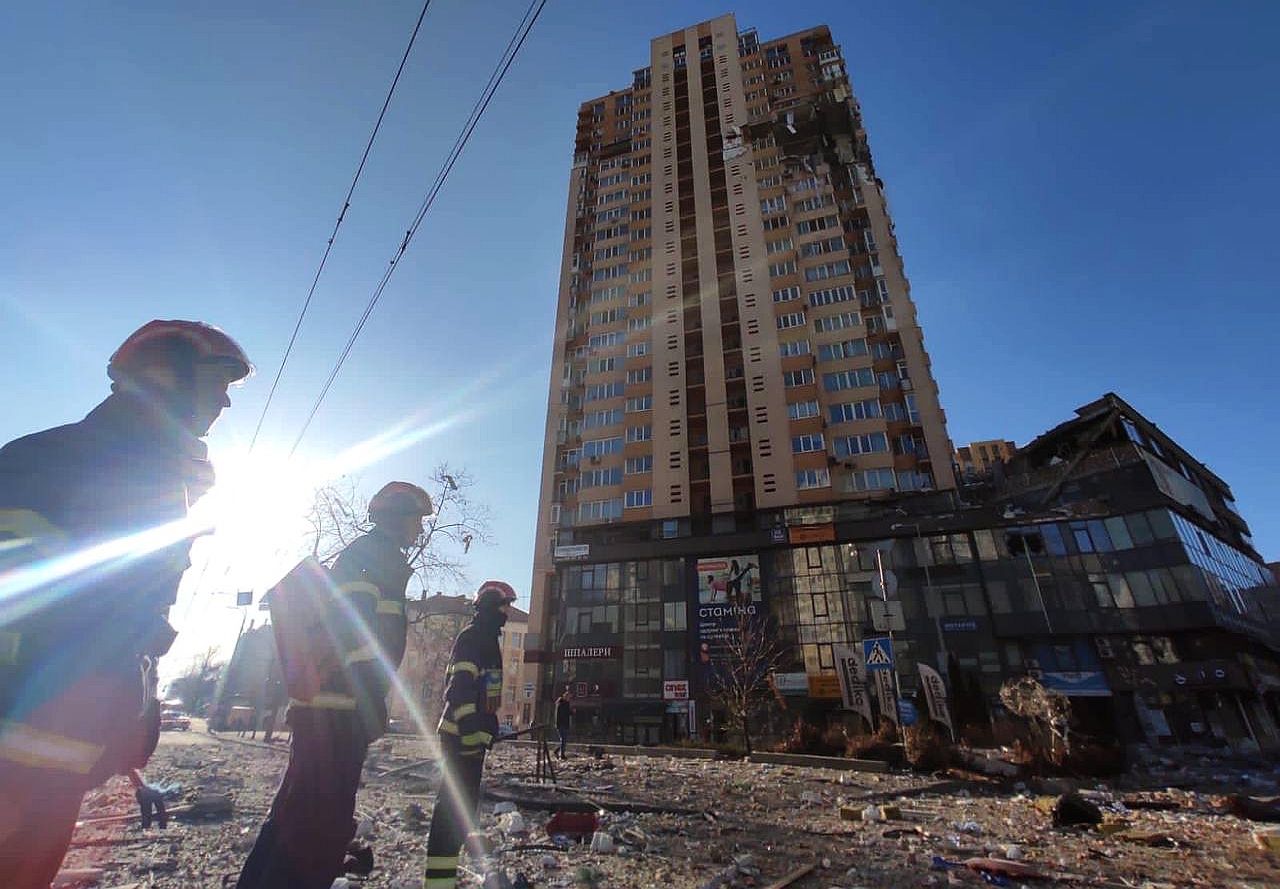
Once, during the first strike in a multi-storey residential building [on 6A Lobanovskyi Avenue], we evacuated a man from the twentieth floor on a stretcher together with other guys. He had an open fracture of his leg. A wall in his apartment building collapsed, and he was thrown back by a wave.
In such moments, it is crucial to constantly talk with a person in order to get them out of shock and to help them understand who is standing in front of them. We need to make it understood that we came to rescue and not to harm them, so that the injured person did not do something inappropriate.
I remember the moment when I arrived at that house in February and saw a giant hole in the top floors. It is hard to believe at first what is happening. But then, you just focus on working to the maximum. You are just doing what is needed.
You go through all floors and examine all apartments. According to protocol, you have to break down doors when nobody opens them in order to make sure that no one is hiding under a bed or in a closet out of fear.
After the strike, the stairs were more or less normal, just covered in glass. There were a lot of people and children who were moving to the outside - frightened, mostly without any things. At that moment, the main thing was just to get out of the building.
When we were transporting that injured man, we started singing the Ukrainian national anthem with him. He instantly forgot about the trauma and was suddenly filled with energy on the way to an ambulance (laughs).
That time, our group alone evacuated three people. There was also a man with an injured leg and a woman, hit by pieces of windowpane.
I don’t know how many times I went up the stairs, descended, and went up again with instruments that day. When we finished working, we were incredibly tired. I was just sitting in our car in silence for some time, trying to comprehend the scale of everything going on.
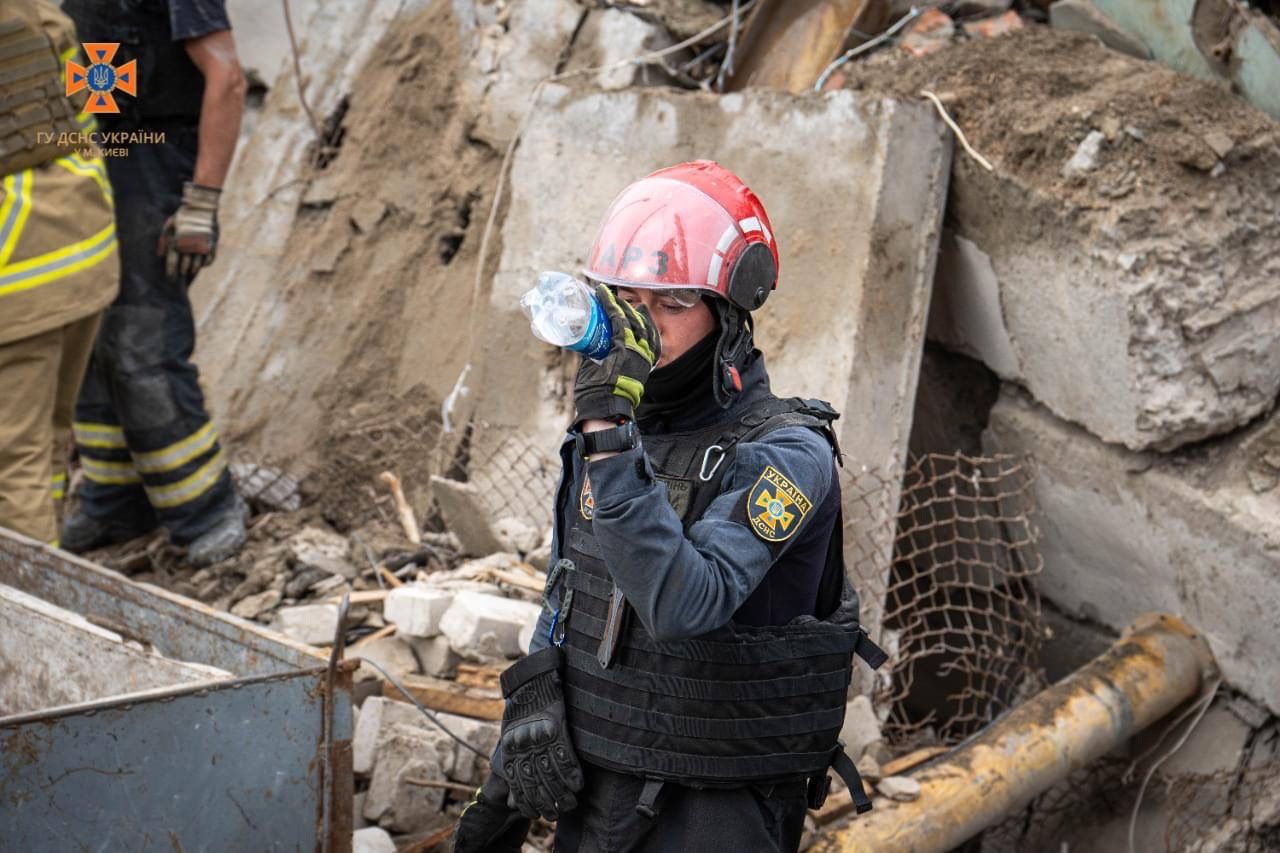
First tragedy
I come from the village of Verkhnii Maidan in Ivano-Frankivsk Oblast. There are five children in our family. Father worked as an electrician on the railroad, mom as an inspector of freight transport.
I have wanted to be a soldier since I was a kid. Everyone tried persuading me that I did not need that, but I liked weapons and everything related to military service. Probably, Hollywood action films affected me (laughs). Moreover, I had a neighbour who talked a lot about his service.
After the seventh grade, I went to the Carpathian Military Sports Lyceum. It was tough at first - a routine and you were not allowed to go home. But you need to go through this and get used to it.
After four years in lyceum, there were a few options, including a military academy. In the end, I had decided to go to the State Emergency Service. I studied in Vinnytsia.
Interesting that before I had to bring documents to a fire station in order to pass the first practice, a neighbour’s house caught fire (laughs). I had some skills already, at the moment I was a student for half a year already. When firefighters arrived, they gave me a barrel. There were no people in the house, everyone was outside.
But the true first baptism with fire happened during the training when I was 17 years old, I believe. The first call was to burning peatland, a very big square, with a petrol station nearby. Peat is hard to put out, we were exhausted afterwards.
I was all covered in dust and soot. A commander said: "Go there, check if everything is alright there." I had just turned and took a step when they shot me with water from a barrel (smiles). This is a tradition of ours: both for the first tasks and when somebody retires.
I moved to Kyiv in 2020. There had been a lot of things, but I saw the first big tragedy was when gas exploded in a multi-storey building [21 June 2020, on 1/5 Krushelnytska Street]. We had just stepped on duty that morning, served a table, and started having breakfast - bang, a call!
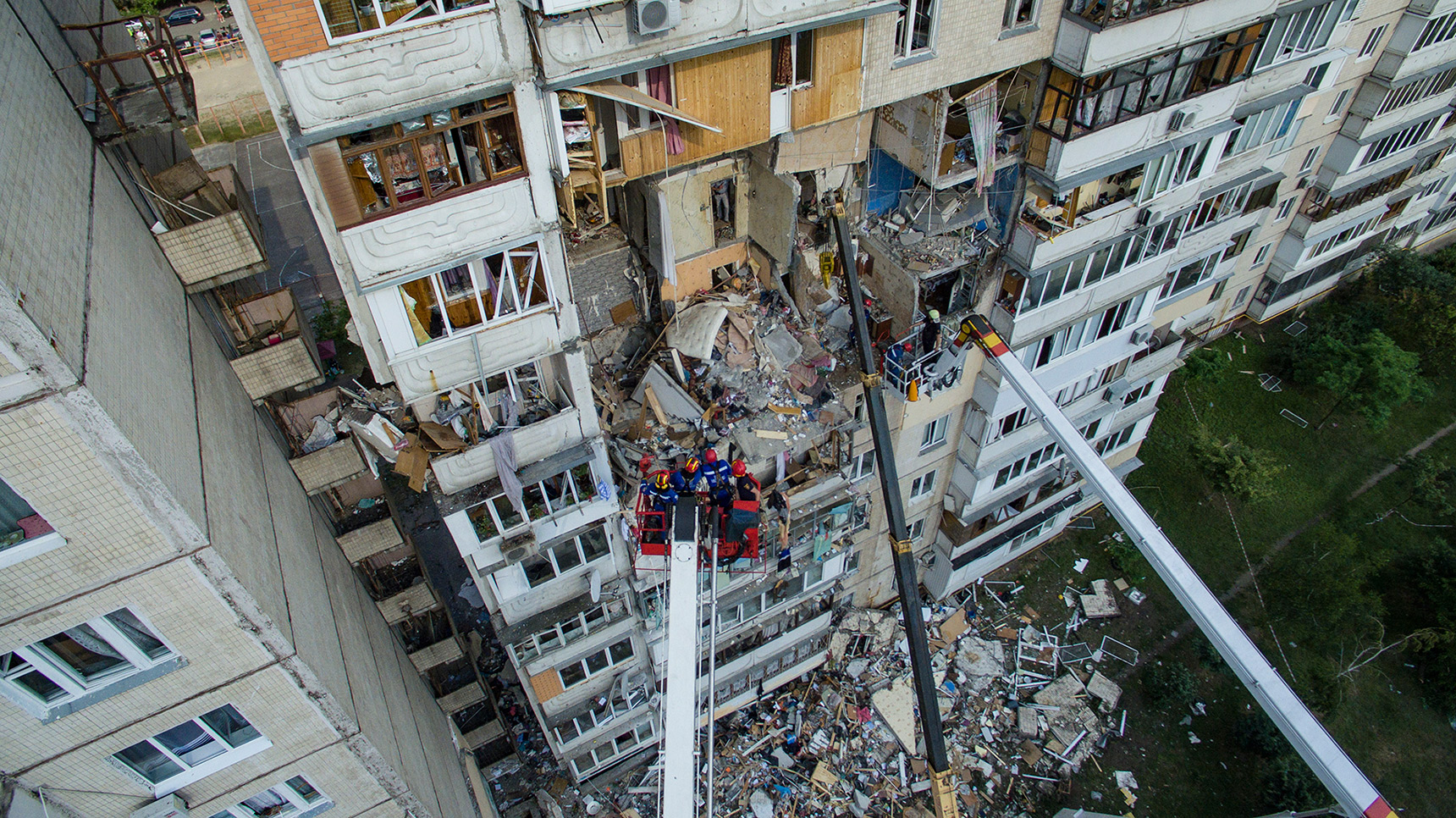
When we arrived, we right away saw a person, thrown to the streets. It was an old-age pensioner, an owner of the apartment where the epicentre of the explosion was. The woman died. She laid there under two slabs. It was impossible to get her out with only hands or instruments. We finally did when a crane arrived.
A friend and I had been working at the site for two days. One commander explained to us how to better perceive what we saw when he found out this was our first such call.
The main thing is not to drag yourself to thoughts of death that, unfortunately, are and will be present. You have to put up with this. This is our job. If you think too much about every dead person, all of these emotions will badly influence your further work.
That gas explosion was a huge tragedy. And in no way could I imagine back then that rockets would fall on residential buildings in Kyiv two years later. That there would be a full-scale war and so many victims.
The value of life
I haven’t counted the number of dead bodies I have seen since 24 February. I think I’ve seen (pauses) around 20.
For example, three factory employees were killed when a factory building was hit by a missile. The blast threw two of them out of the building, but we had to search for the third one. It took us a while: the roof caved in and the walls collapsed.
We cleared away the debris after Kyiv was attacked by drones. We found an elderly woman, a pensioner. She was sitting in an armchair. Her body burned so much it melted together with that armchair. We had to put them in a body bag together, the woman and the armchair.
We were told that during the attack she called someone, told them she was hiding by the fridge in the kitchen and couldn’t go outside. Then, as far as I understand, the second strike occurred and the house collapsed and caught fire.
Our unit normally works in the metro. I remember once a 28-year-old man ended up between the train and the platform at the Arsenalna station. He survived.
His whole body was twisted; his legs and one of his arms were broken. We pulled him out quickly, provided first aid. While we were waiting for an ambulance, police officers asked him why he jumped. He said he was "forced". He was odd.
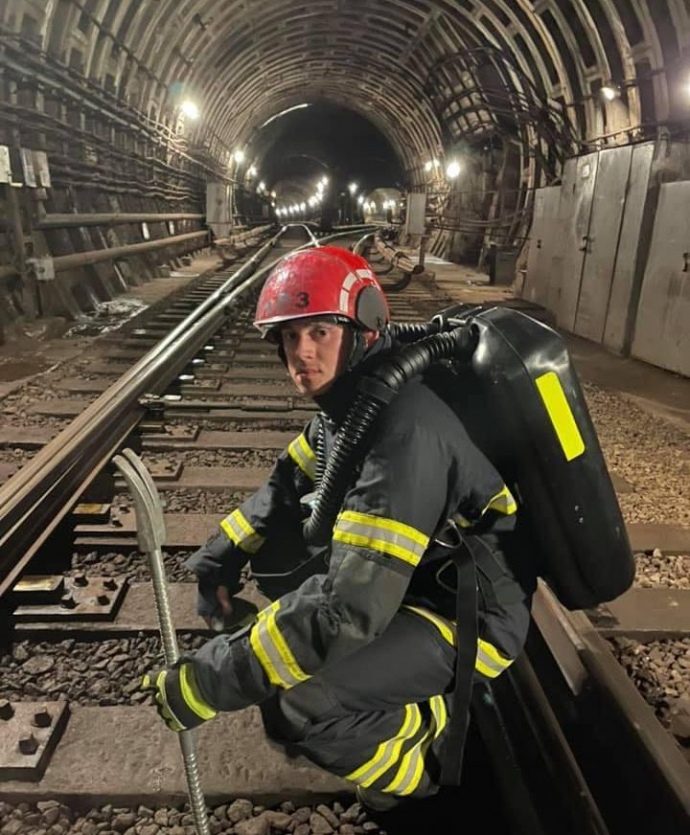
Yurii Lozynskyi: "The only thing I still don’t get is why would anyone launch missiles on civilian houses, on civilians?"
Rescuers have to remain optimistic, to be able to joke despite everything that they see. It makes it so much easier for us. Once we got to the Vydubychi metro station: a man jumped in front of a train and got killed.
So we’re sitting there, waiting for the emergency responders unit to arrive and document everything before we can extract the body. We were telling each other jokes and laughing and people were looking at us astonished, thinking we were lunatics.
I like to spend some time alone at home after work and after particularly challenging cases. Alone with my thoughts. I also love running. When thoughts crowd your mind, you just put on some headphones, turn up the music and run 10 kilometres along the riverfront.
Much has changed since 24 February. I’ve seen a lot, learned a lot about this work, about people, about myself. I, for one, could never believe that it would be possible to do so many things in such a short amount of time, and to be able to withstand so much: all the destruction, all the injured people.
The main thing this experience gives you is a new understanding of the value of life. Everything I used to think of as problems turned out not to be problems at all (laughs). Now everything seems different.
I’ve also found a girlfriend since 24 February. When Kyiv is attacked while I’m on duty, she gets really worried and writes to me. But I can’t always respond to her straight away as I leave my phone in the car.
We knew each other before the 24th, through mutual friends. But I started talking to her after the 24th. I don’t know why, but I decided to write to her after everything that’s happened (smiles).
That day
One night after the beginning of the full-scale invasion I had a dream in which I was a soldier. In the dream, I was sleeping outdoors with my platoon; we were all in sleeping bags on the ground. Shelling started and we were being encircled. All of my fellow soldiers were killed and I was the only one to survive.
Yes, I did dream of joining the military when I was a kid, but now, in the middle of the full-scale war, I’m glad I’m not at the front. I’m here where I belong, doing everything I can. There’s lots of work in Kyiv, too. There’s no one left to do it, other than us.
My friend joined the territorial defence in Irpin when everything was beginning. For a while, I wanted to join him, but I realised that I was needed in Kyiv. At that point, many of my colleagues struggled to get to our base: there was fighting, bridges were blown up, lots of traffic jams. I had to remain here.
I spent some time immediately after 24 February living at the base, because [Russian] tanks marked with a letter V were already deployed right by my house in Irpin.
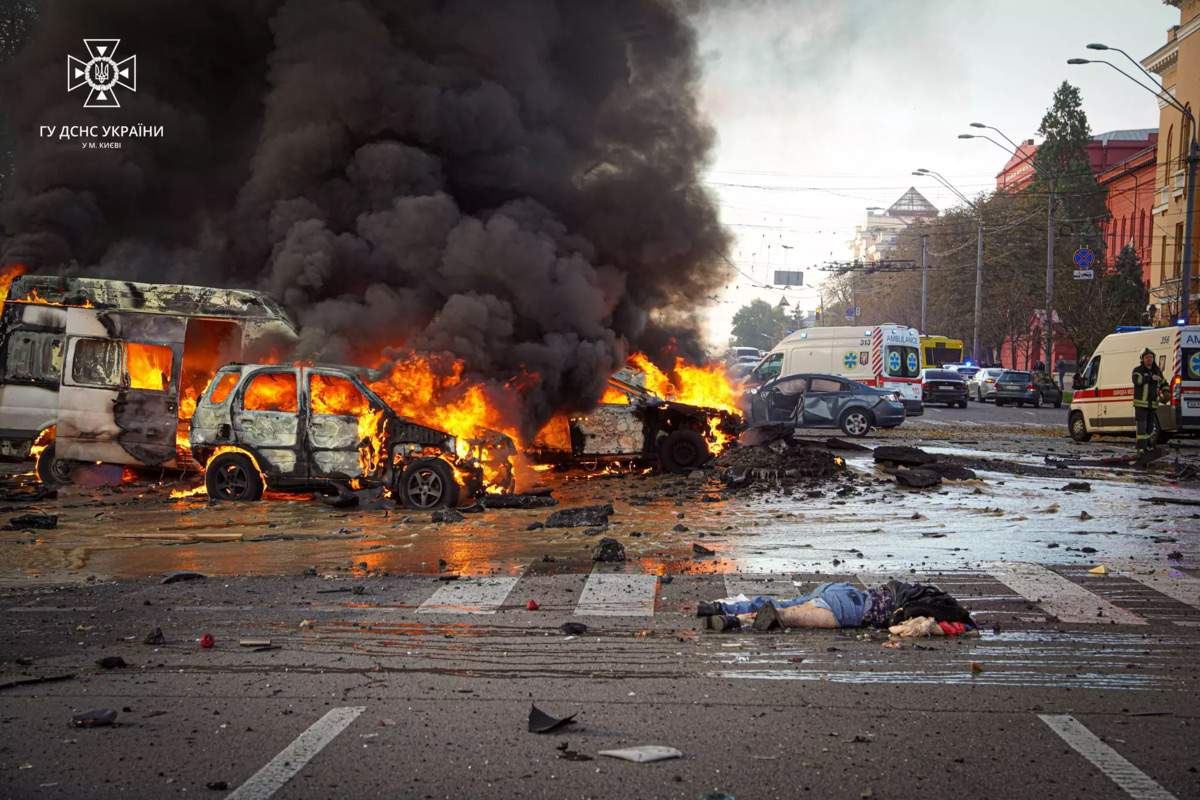
Yurii Lozinskyi about the attack near Shevchenko Park in Kyiv: "We inspected all of the nearby houses, checking whether there were any casualties there. Just as we were finishing up, we heard an explosion very close by, then another one. Our legs gave out."
The day [10 October - ed.] when [the Russians] carried out a large-scale strike on Kyiv was difficult.
First we were dispatched to the intersection by Shevchenko Park. I think six people were killed there. We left them in the cars where they died until the police arrived.
Shortly thereafter we got another call. The Samsung [a high-rise building by the central railway station in Kyiv - ed.] was hit, two nearby buildings sustained lots of damage, there were casualties.
It was dangerous there, lots of damaged glass. It was windy and every now and again large sheets of glass, the size of a van, would hurtle down.
I was exhausted by the end of that assignment (smiles). However strong you are, hauling all of the equipment around with you is pretty hard. I love running, but going up and down stairs all the time…
Imagine wearing protective clothing and equipment, a compulsory armoured vest, and carrying a sledgehammer and a 20-kilogram shaft. And a "hooligan" [a tool for opening doors - ed.].
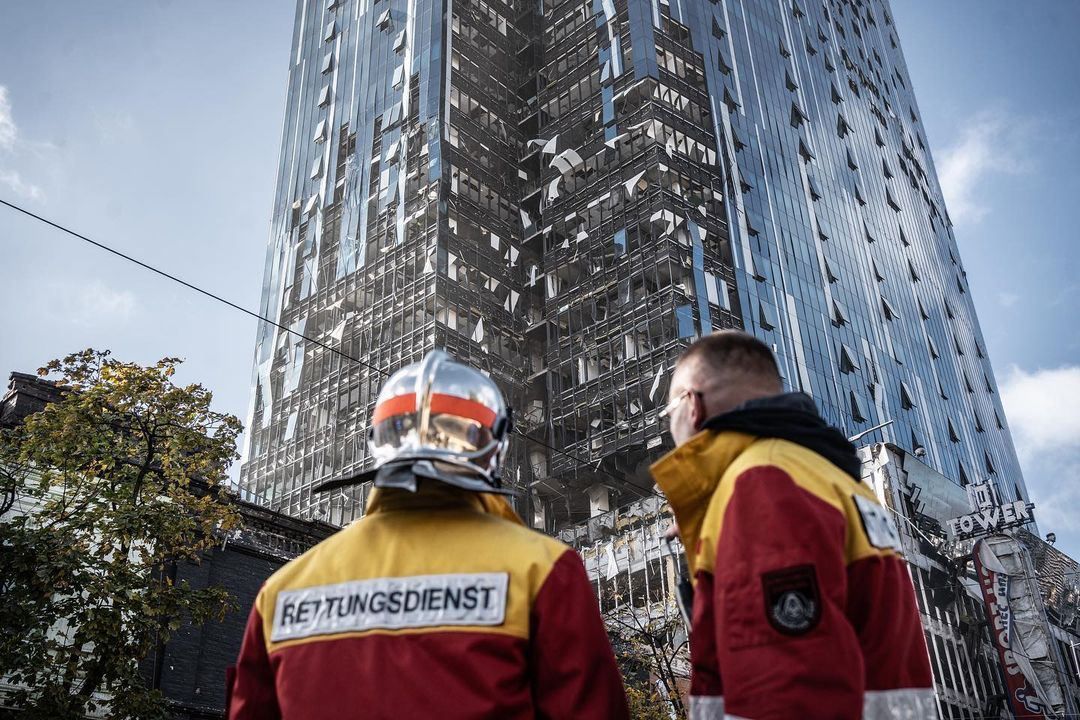
But that wasn’t the last assignment that day. We were dispatched to the scene of a large fire caused by a missile strike on the thermoelectric power plant and the premises of a business in Vydubychi [a neighbourhood in Kyiv - ed.]. We found a security guard with minor injuries.
And then when all of it was over, and I was trying to get some rest, all of my friends started writing to me, forwarding me a video. A presidential address. One of my friends told me to go to a certain time in the video, and I saw Zelenskyy thanking me and my colleague, explicitly referring to our surnames and positions.
"What? Incredible!" I couldn’t believe it.
A dream
Sometimes we as rescuers have to deal with complaints and grievances. There’s always someone who’s unhappy about something.
Some people complain about their apartment getting flooded in the course of extinguishing a fire (laughs). More often, we get complaints about having broken into the apartment.
But what can we do? Those are the rules. You can put the doors back or replace them, but you can’t bring back a person if they die inside without timely help.
But most Kyivites thank us, give us a bit of water, apples, and sweets. Whenever we rescue an older person, they often say "Thank you, dear child" with tears in their eyes. They see me as their grandson or son. In moments like that I also feel on the verge of tears (laughs).
Once we were dispatched to a house that was significantly damaged by a blast. A man was trapped in the elevator. We were lucky: the elevator stopped only some 30 centimetres above the ground floor. We got him out as soon as we got there.
When I used the "scissors" [a special tool - ed.] and opened the elevator doors, the first thing I saw were this man’s eyes. The way he was looking at me (pauses)… I can’t describe it. There was anger, fear and at the same time gratitude for having been rescued in it.
When we got to the basement in the same building, we saw there were people hiding there. Children were sitting on the ground, scared. Some were crying, some were silent. I saw their eyes when I used my flashlight. They were looking at us as if we were gods. There was so much in those eyes that continues to make this work worth doing.
I wouldn’t call myself a hero. That’s just my job. Not every person can handle it, psychologically and physically, but I like it a lot. It gives me confidence in life. It makes me stronger, more mature.
When I was working high up, in that high-rise apartment building that was bombed [at 6A Lobanovskyi Street - ed.] there was a moment when I thought I might die. Air-raid sirens went off and there I was, standing at the edge of a chasm created by a missile. People below me, on the ground, were scattering, but I had nowhere to hide. But I thought: "Whatever happens, happens." And that sense of fear melted away, and I carried on working.
I don’t know what could shock or surprise me anymore. But still, whenever I, for example, go up the stairs into a building damaged in an attack and see a father carrying his child, see that child’s eyes, my heart sinks.
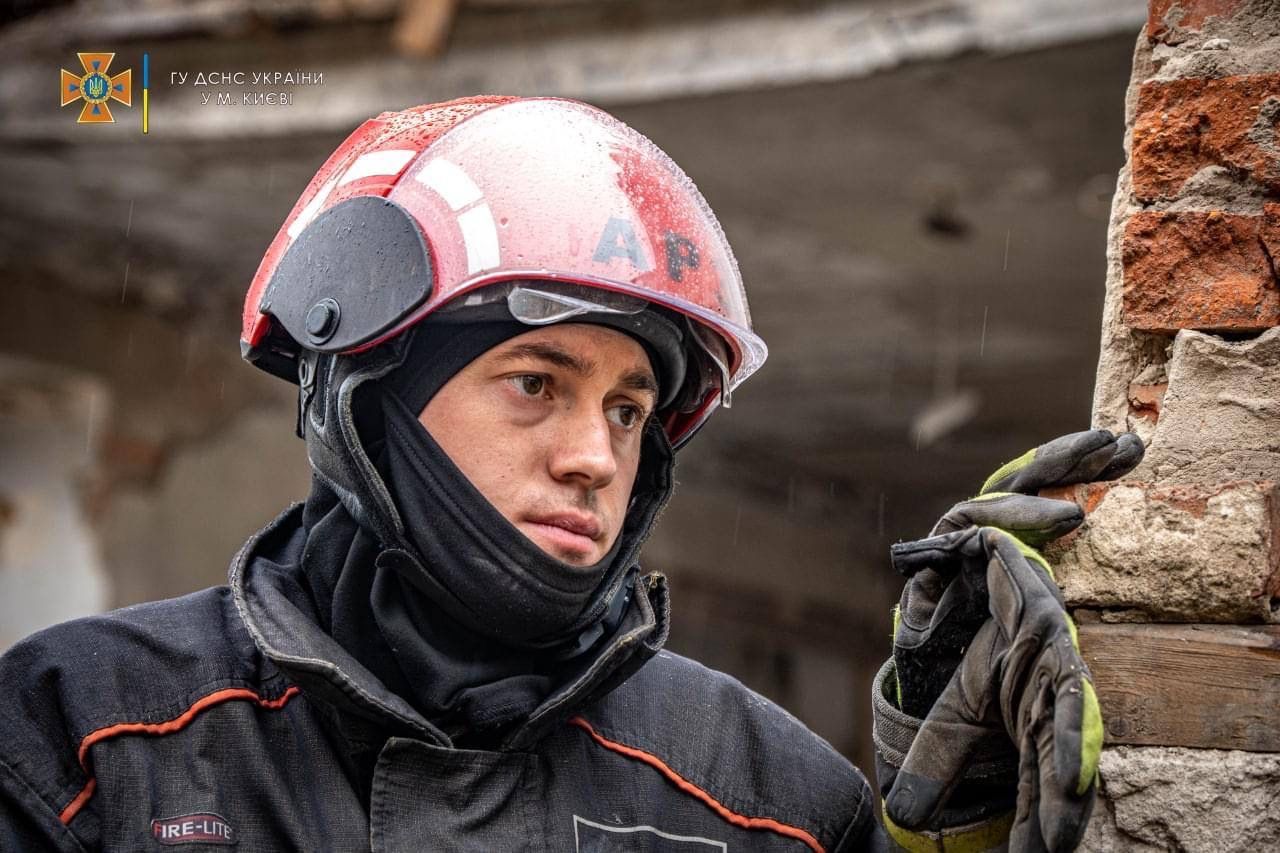
We will definitely win. We will rebuild everything. Everything will be alright. Only the dead won’t come back to life, sadly.
I dream that all of this will end, at last. I dream of going home: I haven’t seen my parents for over a year. I want to go to the mountains, to the forest.
I don’t want to hear the sounds of explosions and air-raid sirens. I don’t want to see destruction and dead bodies.
I want peace.
Yevhen Rudenko, Ukrainska Pravda
Translators: Olga Loza, Myroslava Zavadska
Editors: David Matthews, Dasha Narog